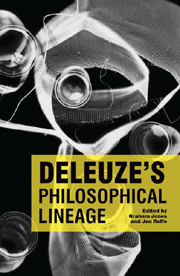Book contents
- Frontmatter
- Contents
- Acknowledgements
- List of Abbreviations
- Introduction: Into the Labyrinth
- 1 Plato
- 2 John Duns Scotus
- 3 G. W. F. Leibniz
- 4 David Hume
- 5 Immanuel Kant
- 6 Solomon Maimon
- 7 G. W. F. Hegel
- 8 Karl Marx
- 9 Hoëne Wronski and Francis Warrain
- 10 Bernhard Riemann
- 11 Gabriel Tarde
- 12 Sigmund Freud
- 13 Henri Bergson
- 14 Edmund Husserl
- 15 A. N. Whitehead
- 16 Raymond Ruyer
- 17 Martin Heidegger
- 18 Pierre Klossowski
- 19 Albert Lautman
- 20 Gilbert Simondon
- Bibliography
- Notes on Contributors
- Index
14 - Edmund Husserl
Published online by Cambridge University Press: 12 September 2012
- Frontmatter
- Contents
- Acknowledgements
- List of Abbreviations
- Introduction: Into the Labyrinth
- 1 Plato
- 2 John Duns Scotus
- 3 G. W. F. Leibniz
- 4 David Hume
- 5 Immanuel Kant
- 6 Solomon Maimon
- 7 G. W. F. Hegel
- 8 Karl Marx
- 9 Hoëne Wronski and Francis Warrain
- 10 Bernhard Riemann
- 11 Gabriel Tarde
- 12 Sigmund Freud
- 13 Henri Bergson
- 14 Edmund Husserl
- 15 A. N. Whitehead
- 16 Raymond Ruyer
- 17 Martin Heidegger
- 18 Pierre Klossowski
- 19 Albert Lautman
- 20 Gilbert Simondon
- Bibliography
- Notes on Contributors
- Index
Summary
Deleuzian Dramaturgy
Deleuze attributes three very distinct functions to the various philosophers he quotes, studies and uses. First and foremost, there are the subjects of his monographs which, with the exception of Kant, he transforms into true and untimely heroes of thought (Hume, Spinoza, Leibniz, Nietzsche, Bergson, Foucault). Then come the genuine enemies against whom he fights philosophical battles (Hegel, Freud starting in the 1970s, Kant to some extent, and more implicitly Wittgenstein). Phenomenologists (namely, Husserl, Heidegger and Merleau-Ponty) hold a place of honour in Deleuzian dramaturgy. They fulfil a third function that is neither heroic nor strictly antagonistic. Deleuze does not fight against phenomenology, rather he struggles with it. Defying phenomenology does not imply turning towards other veins of thought. On the contrary, he must struggle with phenomenology, on its own ground. Deleuze has broken away from Hegelian idealism and psychoanalysis, but despite a certain interpretative belief, he does not place his thought ‘above’ phenomenology. The status he reserves for phenomenology is complex and unique in the Deleuzian corpus since the ‘science’ that stems from Husserl's works is not made the subject of a specific study, though phenomenological themes remain omnipresent in Deleuze's development.
For Deleuze, phenomenology is neither a trusted friend nor a hated enemy. But strangely, it corresponds to the kind of ‘well-loved enemy’ that Deleuze also needs. Phenomenology is an enemy, because it presents an intelligibility of meaning that lends a sort of religious coherence to an ideal world of meaning and signification.
- Type
- Chapter
- Information
- Deleuze's Philosophical Lineage , pp. 261 - 281Publisher: Edinburgh University PressPrint publication year: 2009

